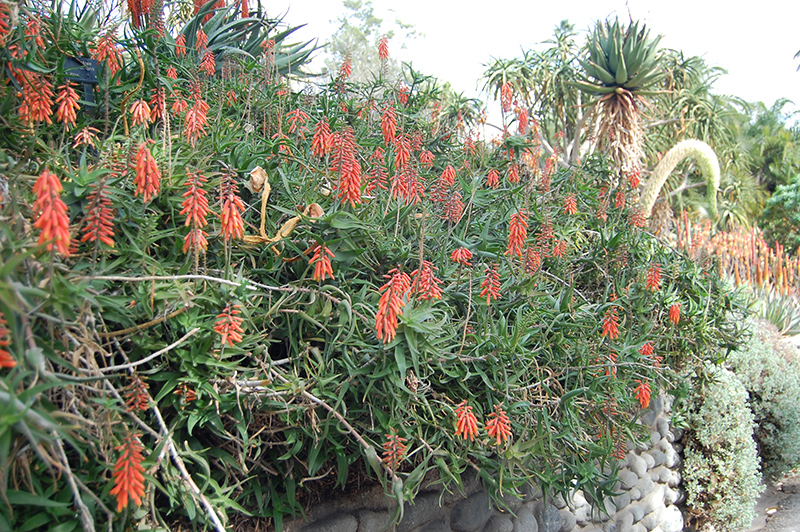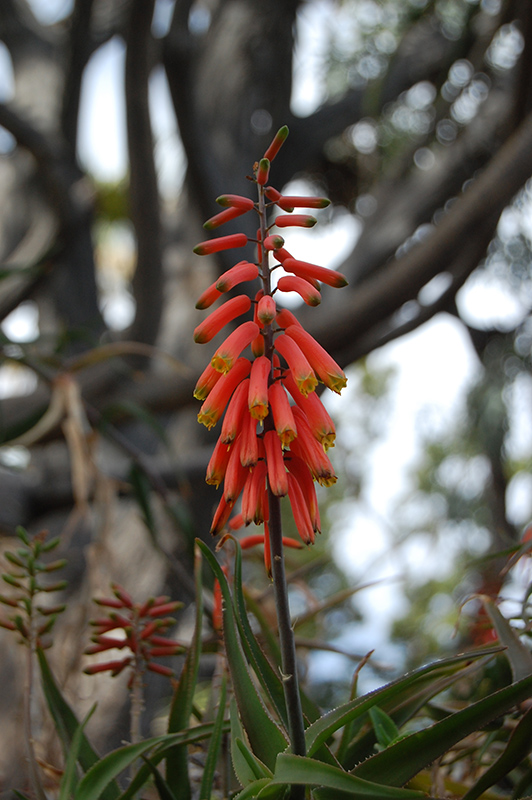Know Before You Go!
Get notified before our plants arrive in stores near you.
Plant Care Library
Height: 12 feet
Spread: 4 feet
Sunlight:
![]()
Hardiness Zone: 9a
Other Names: syn. Aloiampelos ciliaris
Description:
A branching, climbing variety with a spreading habit and many long semi-woody stems ending in rosettes of medium green leaves; produces erect spikes of tubular red-orange flowers all year; great for garden walls, or as a rambling groundcover
Ornamental Features
Climbing Aloe features showy spikes of red flowers with orange overtones and yellow tips rising above the foliage from late winter to late fall. It has attractive green evergreen foliage. The succulent sword-like leaves are highly ornamental and remain green throughout the winter. The smooth gray bark adds an interesting dimension to the landscape.
Landscape Attributes
Climbing Aloe is a multi-stemmed evergreen shrub with a ground-hugging habit of growth. Its strikingly bold and coarse texture can be very effective in a balanced landscape composition.
This shrub will require occasional maintenance and upkeep, and can be pruned at anytime. Deer don't particularly care for this plant and will usually leave it alone in favor of tastier treats. Gardeners should be aware of the following characteristic(s) that may warrant special consideration;
- Spiny
Climbing Aloe is recommended for the following landscape applications;
- Accent
- Hedges/Screening
- Rock/Alpine Gardens
- General Garden Use
- Groundcover
- Container Planting
Planting & Growing
Climbing Aloe will grow to be about 12 feet tall at maturity, with a spread of 4 feet. As a climbing vine, it tends to be leggy near the base and should be underplanted with low-growing facer plants. It should be planted near a fence, trellis or other landscape structure where it can be trained to grow upwards on it, or allowed to trail off a retaining wall or slope. It grows at a fast rate, and under ideal conditions can be expected to live for 40 years or more.
This shrub should only be grown in full sunlight. It prefers dry to average moisture levels with very well-drained soil, and will often die in standing water. It is considered to be drought-tolerant, and thus makes an ideal choice for xeriscaping or the moisture-conserving landscape. It is not particular as to soil pH, but grows best in sandy soils. It is somewhat tolerant of urban pollution. This species is not originally from North America. It can be propagated by cuttings.
Climbing Aloe makes a fine choice for the outdoor landscape, but it is also well-suited for use in outdoor pots and containers. Because of its spreading habit of growth, it is ideally suited for use as a 'spiller' in the 'spiller-thriller-filler' container combination; plant it near the edges where it can spill gracefully over the pot. It is even sizeable enough that it can be grown alone in a suitable container. Note that when grown in a container, it may not perform exactly as indicated on the tag - this is to be expected. Also note that when growing plants in outdoor containers and baskets, they may require more frequent waterings than they would in the yard or garden.
A NetPS Plant Finder tool


